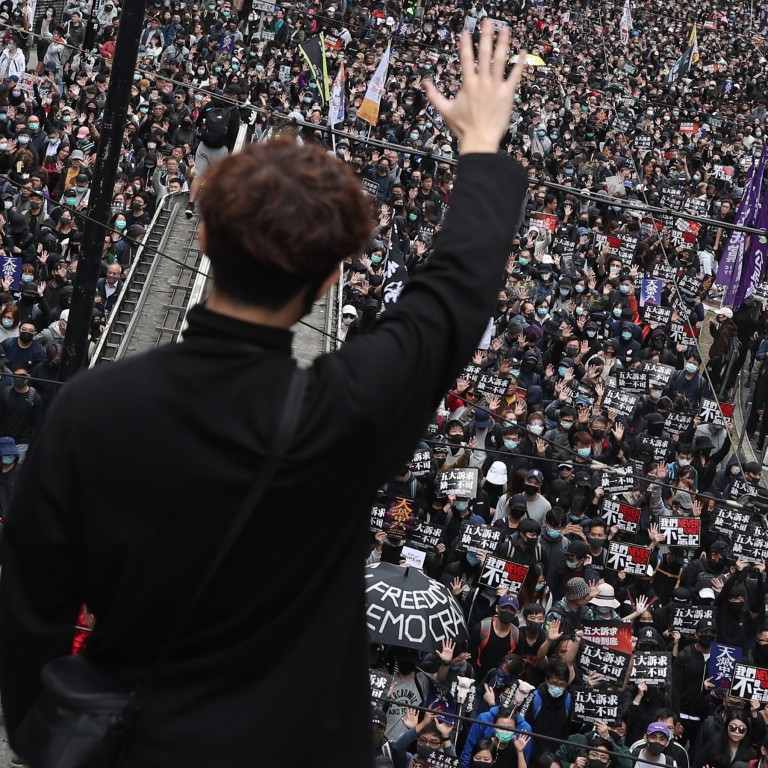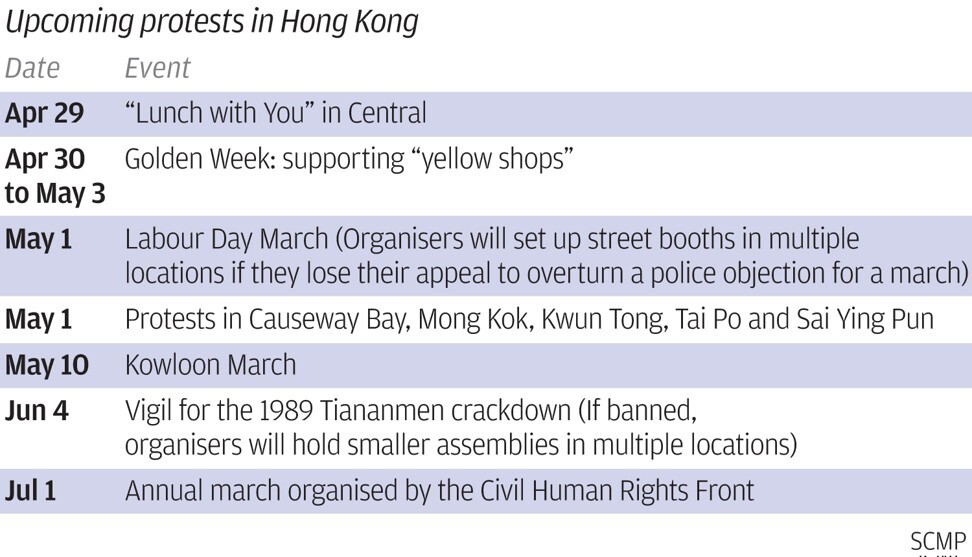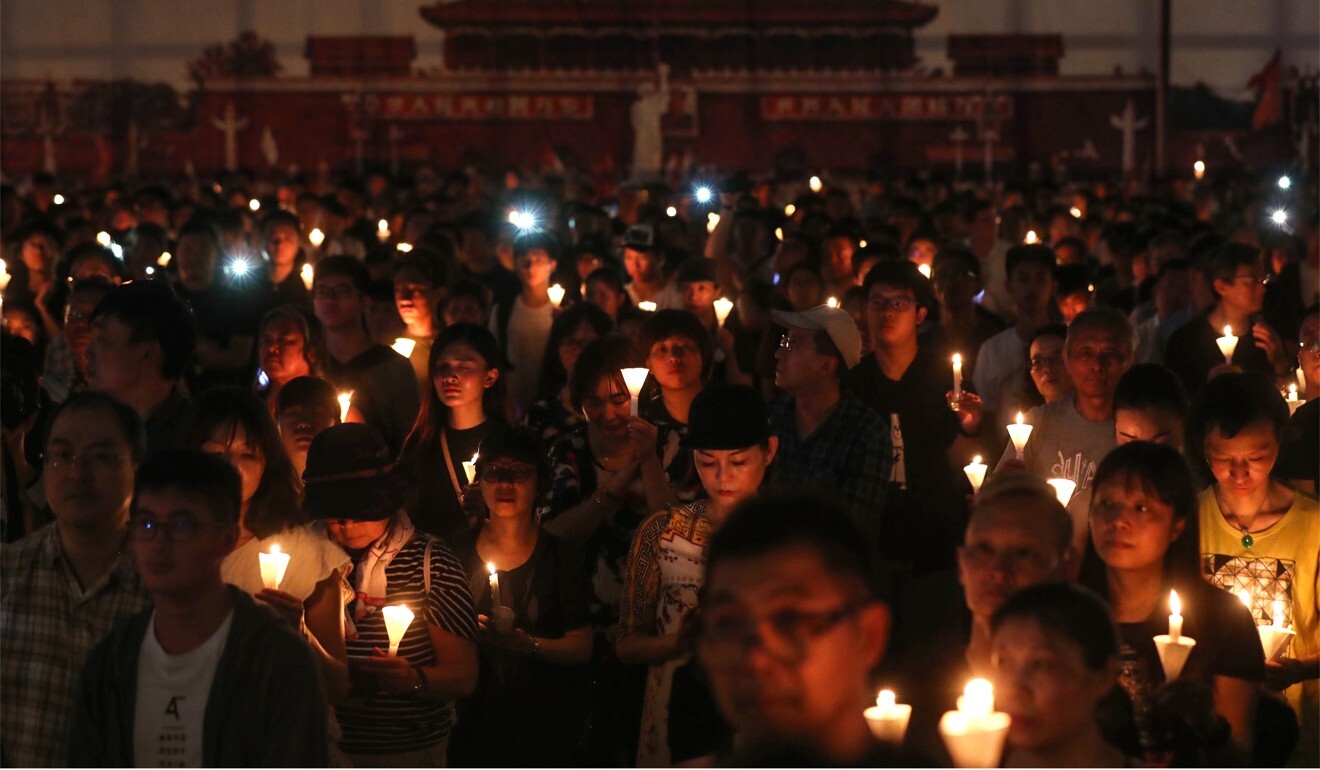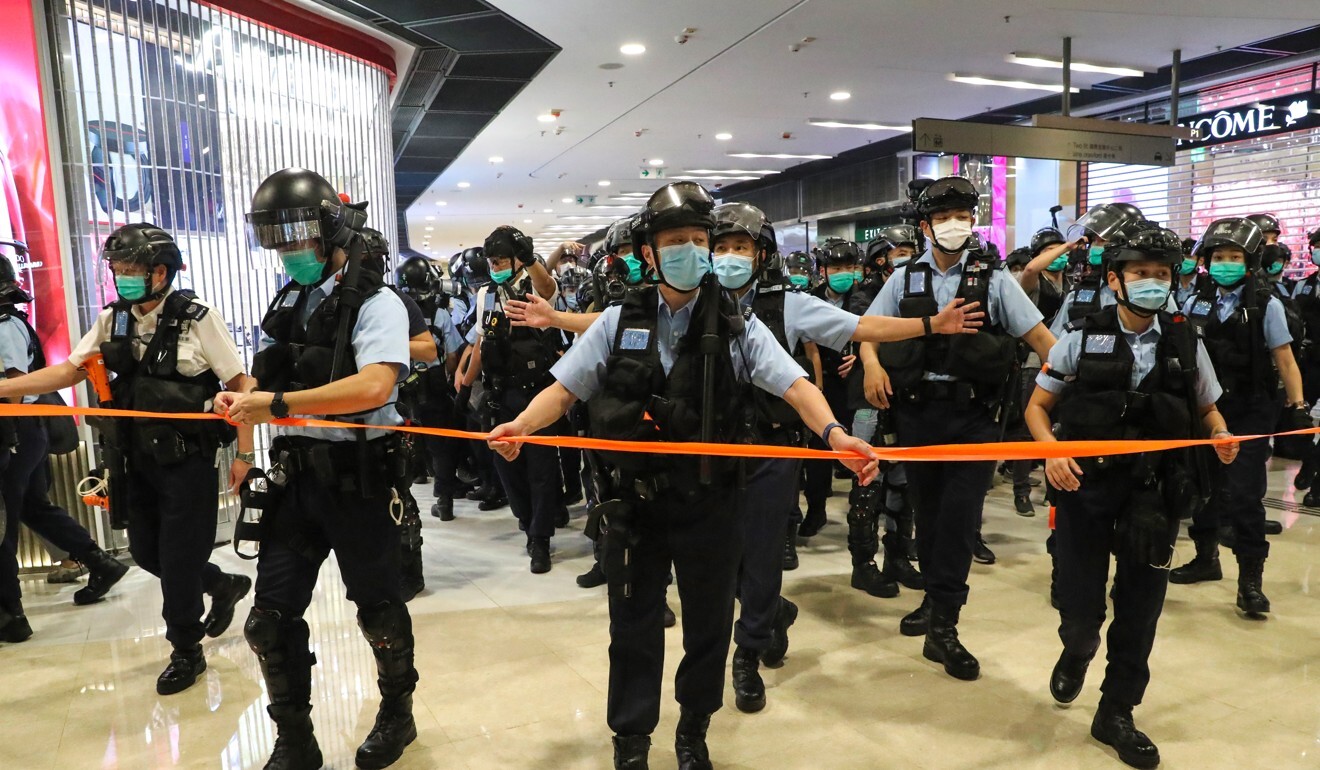
Hong Kong protests: as Covid-19 situation comes under control, city braces for fresh wave of anti-government demonstrations in coming months
- Next few months will be eventful, with the anniversaries of Tiananmen Square crackdown, Hong Kong’s return to China and last year’s marches
- New police strategies and social-distancing laws amid the pandemic have prompted pro-democracy campaigners to formulate alternative protest plans
The chanting of protest songs and slogans such as “Liberate Hong Kong; revolution of our times” by more than 100 masked demonstrators at the International Financial Centre mall in Central was the second protest in just three days.
One of the protesters at the mall was a 45-year-old woman working in the IT sector.
“I was working from home, but I thought I should come out to show my support for the protests,” she said. “I cannot bear the situation in Hong Kong now. There is no rule of law and the judges are handing down unfair judgments.”
Hong Kong protest organisers vow to defy police’s Covid-19 warnings
The peaceful protest came after riot police on Sunday evening flooded into an upscale mall in Taikoo Shing to disperse black-clad protesters holding anti-government banners. Police issued 40 verbal warnings that the protesters were breaching coronavirus social-distancing rules, but no arrests were made.

As the city heaves a sigh of relief after seemingly putting a lid on Covid-19 infections, protesters have regrouped and vowed to return to the streets with new strategies in defiance of police orders.
The next confrontation is likely to be an annual Labour Day rally on Friday. Police banned the rally, even though its organiser, the pro-democracy Confederation of Trade Unions, said marchers would proceed in groups of four and keep their masks on.
The group’s chief executive, Mung Siu-tat, said if they lost their appeal against the force’s decision on Wednesday, they would switch from the planned 2,000-strong march to manning street booths with what he dubbed “blossom everywhere” tactics.
Basic Law’s Article 22 ‘does not apply’ to Beijing’s liaison office, justice secretary says
Mung said the group was mobilising pro-democracy parties and district councillors in hopes of setting up 30 to 40 booths in multiple locations across the city, in an attempt to encourage Hongkongers to join dozens of labour unions formed during the anti-government movement last year.
“Each booth will be managed by not more than four people. If police still crack down on us, it will mean that they want to suppress our right to freedom of expression,” he told the Post on Tuesday.
If police ban the vigil despite the relaxation of the social-distancing measures, it will send out a clear signal to the international community that the authoritarian rule further tightens its grip over Hong Kong
The rule applies to all Hongkongers, with one of the few exceptions being police officers on duty. On Sunday, dozens of riot police stormed into Cityplaza in Taikoo Shing, warning hundreds of protesters who were scattered across several floors of the mall that they would be violating anti-pandemic measures if they assembled there “for the same purpose”.
But new police strategies and the pandemic have prompted pro-democracy campaigners to formulate alternative plans.
To the pro-democracy camp, the next few months will be the most eventful, with the anniversaries of the Tiananmen Square crackdown on June 4, and Hong Kong’s return to China on July 1. Large rallies are held every year to mark the two events.
Adding to the list this year will be the first anniversary of several symbolic assemblies and mass protests that were held when the anti-extradition bill movement erupted last June.
Health care activists rally to threaten government with strikes from new trade unions
The annual June 4 candlelight vigil at Victoria Park has been the only large-scale event within Chinese territory permitted to commemorate the 1989 Tiananmen crackdown.
Lee Cheuk-yan, general secretary of the Hong Kong Alliance in Support of Patriotic Democratic Movements of China, said while the group was waiting for police to decide whether to allow the event to go ahead this year, they had also begun considering backup plans, such as holding smaller scale vigils in multiple districts.
“We will not let the scenes of Hong Kong people clutching candles disappear,” he said.
The group is seeking approval from police with an arrangement that would comply with the 1.5-metre social-distancing measures now in place. But a police source earlier told the Post that law enforcement agencies were trying to find legal ways to block the vigil in the name of defending public health.
“If police ban the vigil despite the relaxation of the social-distancing measures, it will send out a clear signal to the international community that the authoritarian rule further tightens its grip over Hong Kong,” said Lee, who was arrested last week and in February over unlawful protests that took place last year.

Sources familiar with various pro-democracy groups working with the organisation said if mass rallies were not approved by the force, they “might not press ahead risking the safety of participants”. The CHRF will come up with alternative plans next month after studying the situation.
Some people will go back to the street, but fewer people now share the same demands compared to last year when the protesters had united to oppose the extradition bill
The front earlier said it had already applied for police approval for the July march. “Hong Kong people will not back down in the face of mass arrests, and will persist on the irreversible revolution of our times,” it said on its Facebook page.
Throughout the week, protest strategy discussions that had grown quiet in two of the movement’s most popular communication channels – the messaging app Telegram and the Reddit-like forum LIHKG – have revived.
One of the fastest-spreading posts on Tuesday was the “Hongkongers’ schedule”, a regularly updated list of events for protesters to attend.
“We won’t let you arrest people without consequences,” one user wrote, while another posted: “I’ve waited for so long to chant ‘five demands, not one less’ on the street.”
Thousands march in Hong Kong to mark 30th anniversary of Tiananmen crackdown
Golden week, a five-day public holiday in mainland China, for years has boosted the city’s tourism and catering businesses with the influx of tourists from the mainland. But worldwide travel restrictions have seen the number of visitors to the city plunge in recent months.
Speaking on condition of anonymity, a protester who was involved in the shopping campaign said more than 1,000 of the so-called yellow shops had registered with them to display posters containing protest slogans and offer discounts to citizens.

A senior police source said the force noticed that protesters were again urging people online to come out and join demonstrations, but he believed it was largely propaganda.
“They want to keep up the momentum, but I don’t think people will be mobilised on a large scale amid the social-distancing ban,” he said. “Having said that, police will reserve manpower to deal with any possible chaos.”
Police said on their official Facebook page on Tuesday there had been signs suggesting the return of protest activities as the pandemic was getting under control in the city.
The force urged members of the public to avoid unnecessary gatherings to minimise the risk of catching the infection.
Survey of Hong Kong protesters says 80 per cent support ‘one country, two systems’
“Police will strictly enforce the law to help keep the outbreak at bay,” it said.
City University public policy associate professor Edmund Cheng Wai believed the scale of the new wave of street demonstrations would not be as huge as the protests that erupted last June.
“Some people will go back to the street, but fewer people now share the same demands compared to last year when the protesters had united to oppose the extradition bill,” he said.
“And when businesses are hit hard by the coronavirus, more people will count on the government’s relief measures and prefer a stable social condition to revive the economy.”
He hoped the force would use the coming months to regain the public’s trust, by helping residents to exercise their right to assemble, instead of banning them on the pretext of public health risks.
Additional reporting by Zoe Low, Victor Ting and Christy Leung


